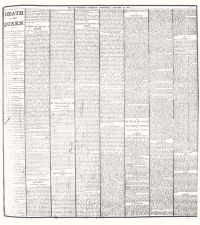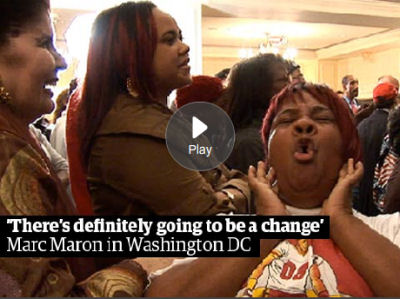Das ist natürlich etwas blöd, erst jetzt, nach dem amerikanischen Wahlkampf, auf die Serie von Videos hinzuweisen, die der britische „Guardian“ mit dem Komiker Marc Maron auf einer Reise quer durch die Vereinigten Staaten produziert hat. Aber ich habe das gerade erst entdeckt — genauer gesagt: das letzte Video, das gestern am Wahltag in Washington DC entstanden ist. Es ist eine feine, unterhaltsame, meinungsstarke, fürs Web wunderbar geeignete Form:
Schlagwort: Guardian
Der „Guardian“ wird 50.000
 Am Montag erscheint die 50.000. Ausgabe des von mir heißgeliebten „Guardian“. Um das zu feiern, zeigt die Zeitung unter anderem 50 historische Titelblätter, zum Beispiel die zum Tod von Königin Victoria (rechts).
Am Montag erscheint die 50.000. Ausgabe des von mir heißgeliebten „Guardian“. Um das zu feiern, zeigt die Zeitung unter anderem 50 historische Titelblätter, zum Beispiel die zum Tod von Königin Victoria (rechts).


Die Zukunft des Journalismus
Alan Rusbridger, Chefredakteur der (von mir heißgeliebten) britischen Tageszeitung „Guardian“, hat vor Zeitungs-Ombudsleuten eine Rede über „Ombudsmänner in der digitalen Zukunft“ gehalten, in der er bemerkenswerte Dinge sagte über den Journalismus, wie sich seine Natur gerade rasant verändert und wie Journalisten und Medien darauf reagieren müssen:
(…) As journalists, we’re doing well if we confine ourselves to being truthful about what we know, which is often (through no fault of our own) fairly circumscribed. We’re doing better if we’re also truthful about what we don’t know. We should always be uneasy at grandiose boasts that we’re revealing The Truth.
(…) handing down tablets of stone and telling people „this is how it is” is a less persuasive proposition than it once was.
(…) the readers, users — call them what you will – have now got such good real time access to much of the information which was once our exclusive preserve. By that I mean that the traditional news media were, on the day, (and, indeed, for most people at all) the only source of information. A speech, a debate, a report, a scientific paper – most people had few independent ways of verifying a newspaper or broadcast account, certainly on the day it was published or broadcast. Now a huge amount of information is simultaneously released on official websites, enabling millions of people to check your version of events against the original.
What does that mean? It means that inquiring, suspicious or specialist readers (by which I mean people with a particular interest in a particular subject) will swiftly be able to test your journalism for accuracy or bias against any published information. Of course, we still have sources of information not available to just anyone. But today there are millions of fact checkers out there. Millions of them have their own blogs or websites. So we can refuse systematically to correct or clarify our journalism, but we would be foolish to imagine that it will therefore go uncorrected or unclarified. It will: all that will happen is that it will take place elsewhere.
And, of course, that will still happen even if you do have your own processes in place. The question editors have to face is: is it not a bit uncomfortable knowing that your failings may be revealed and widely discussed elsewhere, with not a word appearing in your own newspaper or on your own channel? Which is the road to building trust — engaging or ignoring?
(…) in truth, a passionate debate is raging out there in a way which many mainstream journalists have not quite yet appreciated. At times it feels more like a cacophony than a debate, it’s true. But various technological and economic forces are bearing down on what we do so forcefully and, frankly, so fast, that the very nature of journalism is being challenged in fundamental ways that have yet to filter back into more conventional print-focused newsrooms.
As with all these developments, so-called old media has a decision to make — whether to stand aloof from them and basically say „that’s not what we do.“ Or else to try it out on the basis that it might, indeed, not be what we do, but there are some things we can learn from it, or which might impact on us. And of course there is a third possibility: that we try it out and decide that that’s exactly what we should be doing. (…)
Die außerordentlich lesenswerte Rede Rusbridgers im Original und in der Zusammenfassung von Deborah Howell, Ombudsfrau der „Washington Post“.
